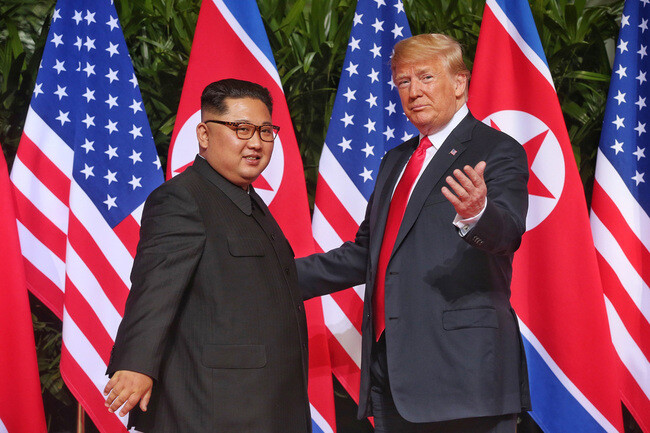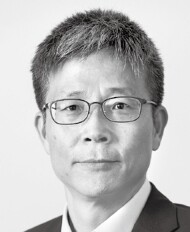hankyoreh
Links to other country sites 다른 나라 사이트 링크
[Correspondent’s column] Responsibility to change status quo increasingly falls on South and North Korea

From March until June, it seemed like there was about to be dramatic change on the Korean Peninsula, but now we appear to have entered a lull. Expectations were so high that the current period of quietude almost feels awkward.
Generally speaking, the current situation can be defined as a struggle between the efforts to maintain and change the status quo. This is similar to the physical phenomenon of an object remaining in place when it is being pushed and pulled by equivalent forces.
Since the collapse of the Soviet bloc in the 1990s, North Korea has been trying to change the status quo in order to improve relations with the US and guarantee the security of its regime. These attempts did not bear fruit under the administrations of Bill Clinton, George W. Bush and Barack Obama. It was the rise of Donald Trump, considered the most nontraditional outsider in US history to become president, that caused cracks to form in the status quo. The period from March to June was a time when the excitement about the opening of those cracks suppressed the anxiety resulting from our inability to predict where that change will lead.
Fear of responsibility is psychological basis for maintaining status quo;
But just over a month after the North Korea-US summit in Singapore, the deep-rooted inertia of the status quo is gaining strength. Under pressure from the prevailing view that Trump made concessions without getting anything in return, the US government has been overselling the concessions it has already made and those it may make in the future. If this goes beyond a strategy to gain the advantage in the negotiations with North Korea and is aimed at avoiding responsibility for the failure of those negotiations, the negotiations will not go anywhere. Fear of responsibility is the psychological basis for maintaining the status quo.
For example, many Americans feel that declaring the end of the Korean War is a step too far unless major progress is made toward denuclearization. Various reasons are adduced to boost the value of this politically symbolic event. Some argue that it could lead to calls for the dissolution of the UN Command and the removal of American troops from the Korean Peninsula, while others say it is too soon for the issue of a peace regime to be added to the agenda. This approach makes formally ending the war so intimidating that it will forfeit its significance as leverage in the negotiations and collapse under its own weight.
As the two sides move into the technical negotiations, we will see even more fear of responsibility from the officials who are involved in the negotiations, the repetition of tired arguments in the mainstream of public opinion and objections by experts worried about losing status if the status quo changes. This is a phenomenon that will occur not only in the US but also in North Korea, albeit in a different guise.
Status quo seems to be China’s objective
If we turn our attention to China, maintaining the status quo on the Korean Peninsula appears to be Beijing’s manifest position as well. It seemed as if Chinese President Xi Jinping would make a point of visiting North Korea after the North’s summit with the US, given Kim Jong-un’s three visits to China, but there are no tangible signs of that happening.
A China expert in Washington told me that “Xi won’t feel an urgent need to visit North Korea” unless the North takes a major step toward denuclearizing, causing its relations with the US to rapidly improve; the situation on the Korean Peninsula deteriorates, causing tensions to rise once more; or the trade war between the US and China intensifies even further. Given China’s traditional policy approach to the Korean Peninsula, that’s not really surprising.

In the end, pushing for a change in the status quo and setting its course is gradually becoming the responsibility of South and North Korea. The North isn’t likely to disclose the location of its nuclear weapon and missile facilities, because that disclosure would lead to their dismantlement. But the fact is that progress is unlikely to be made without that disclosure. I want to believe that North Korea won’t let this opportunity for changing the status quo – an opportunity it has sought for so long – to just slip through its fingers.
I’m told that South Korean government officials are racking their brains over how to take advantage of events coming up in September, including the UN General Assembly. There’s no telling what Trump will do after the US midterm elections in November. Rather than suggesting that Seoul should move with caution amid the current volatility, I’m more inclined to side with the argument that proactive steps should be taken now, since there’s even greater uncertainty about what will follow the midterm elections.
By Yi Yong-in, Washington correspondent
Please direct comments or questions to [english@hani.co.kr]

Editorial・opinion
![[Column] Park Geun-hye déjà vu in Yoon Suk-yeol [Column] Park Geun-hye déjà vu in Yoon Suk-yeol](https://flexible.img.hani.co.kr/flexible/normal/500/300/imgdb/original/2024/0424/651713945113788.jpg) [Column] Park Geun-hye déjà vu in Yoon Suk-yeol
[Column] Park Geun-hye déjà vu in Yoon Suk-yeol![[Editorial] New weight of N. Korea’s nuclear threats makes dialogue all the more urgent [Editorial] New weight of N. Korea’s nuclear threats makes dialogue all the more urgent](https://flexible.img.hani.co.kr/flexible/normal/500/300/imgdb/original/2024/0424/7317139454662664.jpg) [Editorial] New weight of N. Korea’s nuclear threats makes dialogue all the more urgent
[Editorial] New weight of N. Korea’s nuclear threats makes dialogue all the more urgent- [Guest essay] The real reason Korea’s new right wants to dub Rhee a founding father
- [Column] ‘Choson’: Is it time we start referring to N. Korea in its own terms?
- [Editorial] Japan’s rewriting of history with Korea has gone too far
- [Column] The president’s questionable capacity for dialogue
- [Column] Are chaebol firms just pizza pies for families to divvy up as they please?
- [Column] Has Korea, too, crossed the Rubicon on China?
- [Correspondent’s column] In Japan’s alliance with US, echoes of its past alliances with UK
- [Editorial] Does Yoon think the Korean public is wrong?
Most viewed articles
- 1‘We must say no’: Seoul defense chief on Korean, USFK involvement in hypothetical Taiwan crisis
- 2Will NewJeans end up collateral damage in internal feud at K-pop juggernaut Hybe?
- 3[Column] Park Geun-hye déjà vu in Yoon Suk-yeol
- 4Why Korea shouldn’t welcome Japan’s newly beefed up defense cooperation with US
- 5Thursday to mark start of resignations by senior doctors amid standoff with government
- 6N. Korean hackers breached 10 defense contractors in South for months, police say
- 7[Guest essay] The real reason Korea’s new right wants to dub Rhee a founding father
- 8[Column] ‘Choson’: Is it time we start referring to N. Korea in its own terms?
- 9Kim Jong-un expressed ‘satisfaction’ with nuclear counterstrike drill directed at South
- 10[Editorial] New weight of N. Korea’s nuclear threats makes dialogue all the more urgent